Family Therapy Reflective Essay: South African Context and Analysis
VerifiedAdded on 2022/09/26
|10
|2314
|19
Essay
AI Summary
This essay provides a comprehensive overview of family therapy, a psychological treatment approach addressing issues impacting family health and function. The essay begins with an introduction highlighting the prevalence of mental health issues in South Africa and the role of family dynamics. It then discusses the fundamental principles of family systems therapy, including key concepts and therapeutic techniques. The essay further examines the applicability of family therapy in multicultural contexts, particularly in South Africa, considering cultural values and potential challenges. The benefits of family therapy are explored, including improved communication and conflict resolution. The author reflects on personal experiences and how family therapy could have been beneficial. The essay concludes by acknowledging limitations, such as cultural issues and unrealistic expectations, and emphasizes the importance of cultural sensitivity and realistic goal-setting in therapy.
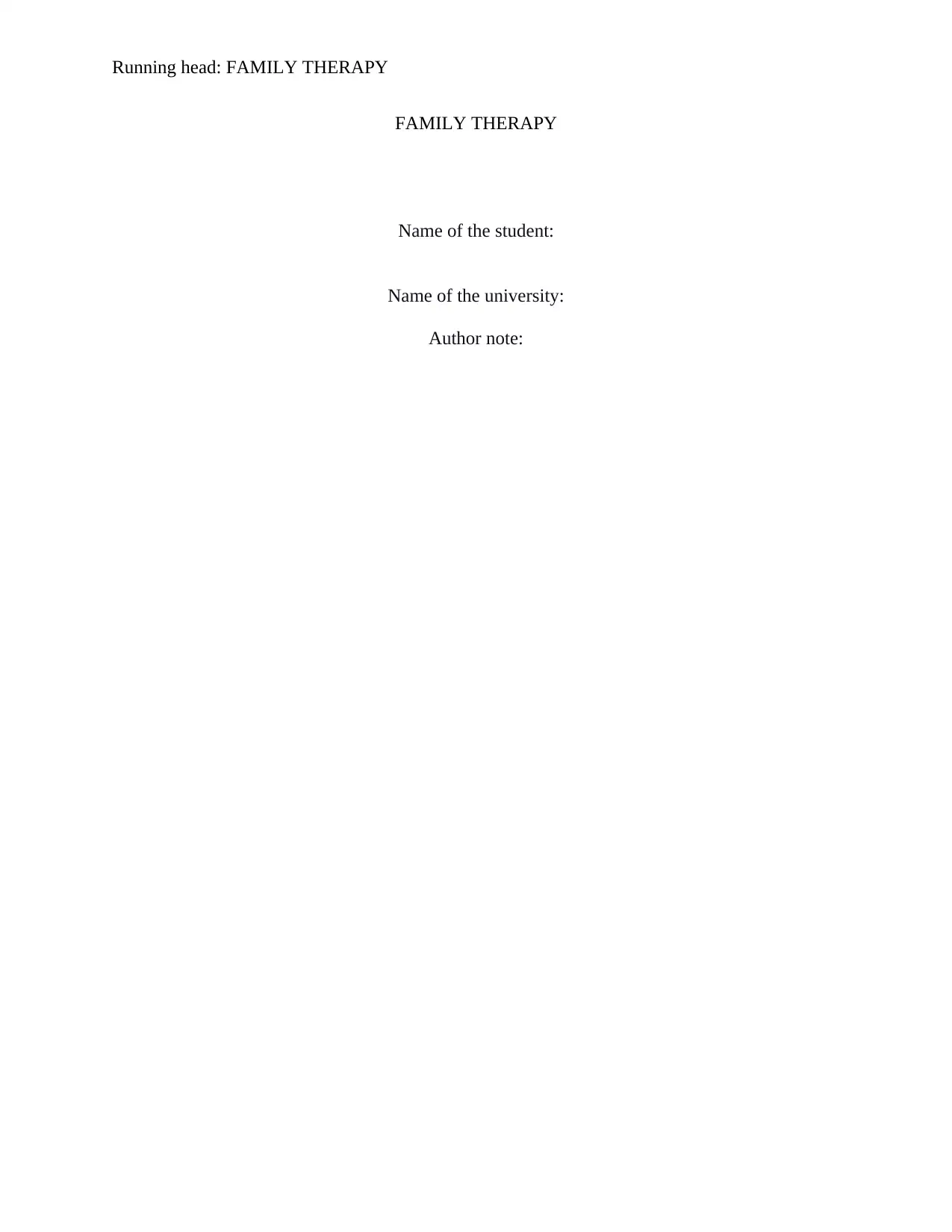
Running head: FAMILY THERAPY
FAMILY THERAPY
Name of the student:
Name of the university:
Author note:
FAMILY THERAPY
Name of the student:
Name of the university:
Author note:
Paraphrase This Document
Need a fresh take? Get an instant paraphrase of this document with our AI Paraphraser
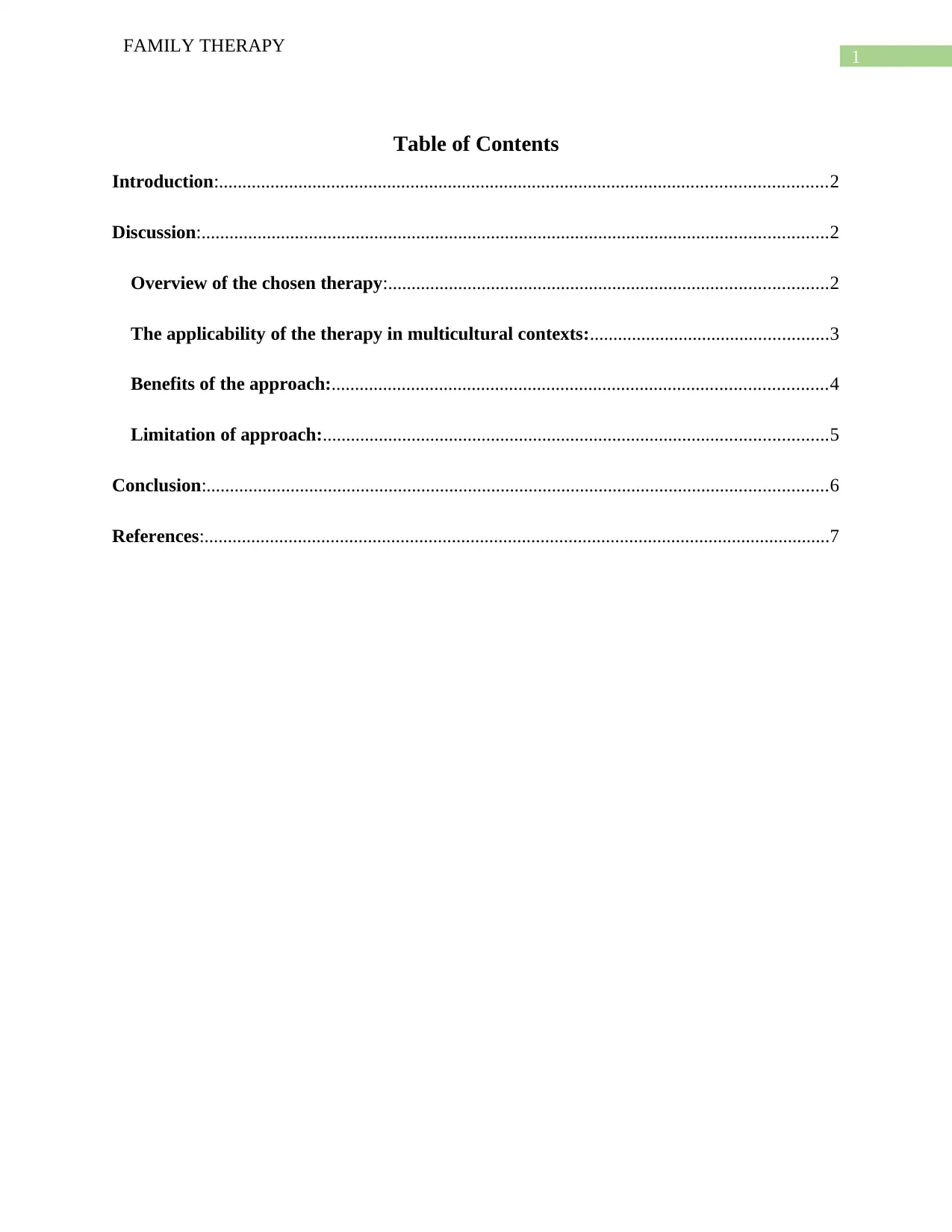
1
FAMILY THERAPY
Table of Contents
Introduction:..................................................................................................................................2
Discussion:......................................................................................................................................2
Overview of the chosen therapy:..............................................................................................2
The applicability of the therapy in multicultural contexts:...................................................3
Benefits of the approach:..........................................................................................................4
Limitation of approach:............................................................................................................5
Conclusion:.....................................................................................................................................6
References:......................................................................................................................................7
FAMILY THERAPY
Table of Contents
Introduction:..................................................................................................................................2
Discussion:......................................................................................................................................2
Overview of the chosen therapy:..............................................................................................2
The applicability of the therapy in multicultural contexts:...................................................3
Benefits of the approach:..........................................................................................................4
Limitation of approach:............................................................................................................5
Conclusion:.....................................................................................................................................6
References:......................................................................................................................................7
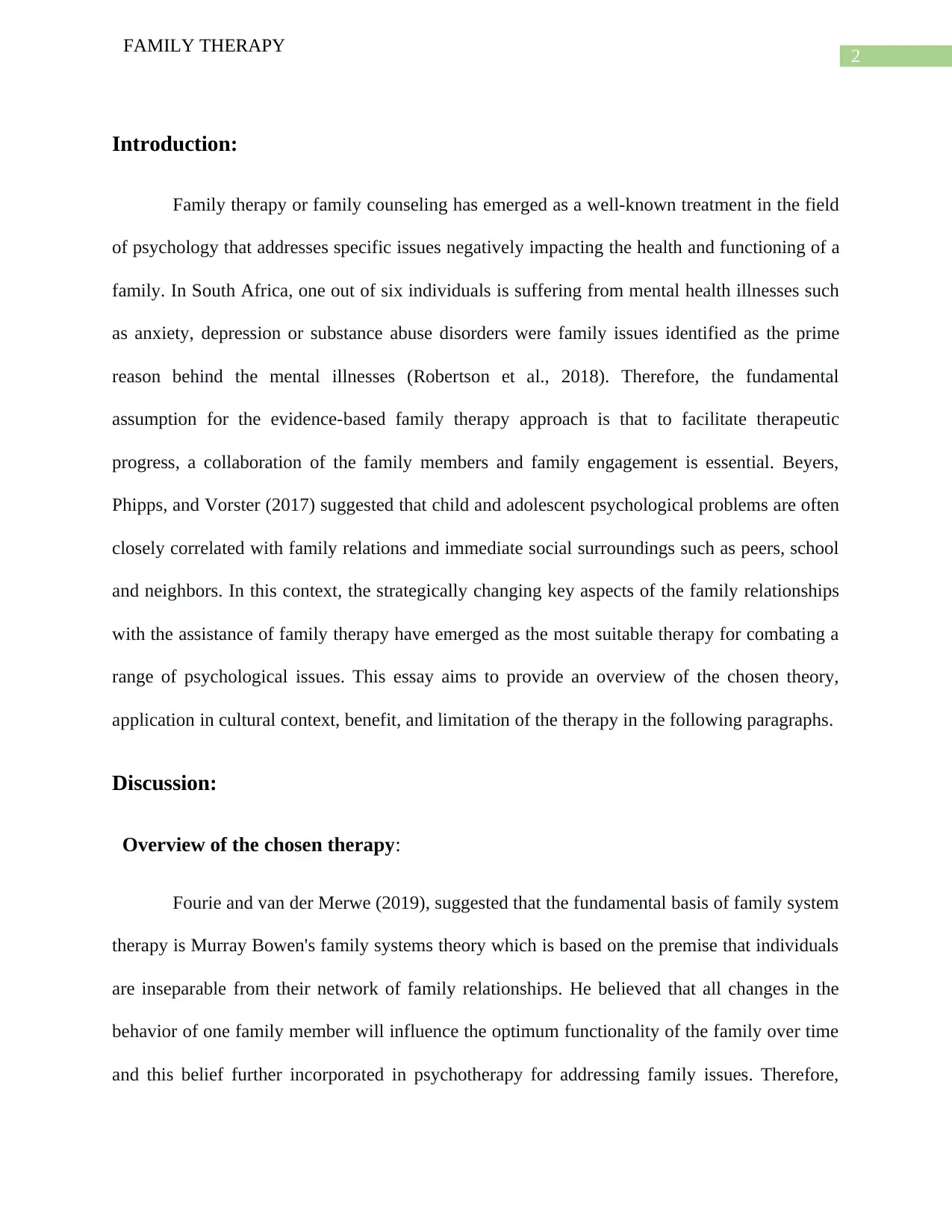
2
FAMILY THERAPY
Introduction:
Family therapy or family counseling has emerged as a well-known treatment in the field
of psychology that addresses specific issues negatively impacting the health and functioning of a
family. In South Africa, one out of six individuals is suffering from mental health illnesses such
as anxiety, depression or substance abuse disorders were family issues identified as the prime
reason behind the mental illnesses (Robertson et al., 2018). Therefore, the fundamental
assumption for the evidence-based family therapy approach is that to facilitate therapeutic
progress, a collaboration of the family members and family engagement is essential. Beyers,
Phipps, and Vorster (2017) suggested that child and adolescent psychological problems are often
closely correlated with family relations and immediate social surroundings such as peers, school
and neighbors. In this context, the strategically changing key aspects of the family relationships
with the assistance of family therapy have emerged as the most suitable therapy for combating a
range of psychological issues. This essay aims to provide an overview of the chosen theory,
application in cultural context, benefit, and limitation of the therapy in the following paragraphs.
Discussion:
Overview of the chosen therapy:
Fourie and van der Merwe (2019), suggested that the fundamental basis of family system
therapy is Murray Bowen's family systems theory which is based on the premise that individuals
are inseparable from their network of family relationships. He believed that all changes in the
behavior of one family member will influence the optimum functionality of the family over time
and this belief further incorporated in psychotherapy for addressing family issues. Therefore,
FAMILY THERAPY
Introduction:
Family therapy or family counseling has emerged as a well-known treatment in the field
of psychology that addresses specific issues negatively impacting the health and functioning of a
family. In South Africa, one out of six individuals is suffering from mental health illnesses such
as anxiety, depression or substance abuse disorders were family issues identified as the prime
reason behind the mental illnesses (Robertson et al., 2018). Therefore, the fundamental
assumption for the evidence-based family therapy approach is that to facilitate therapeutic
progress, a collaboration of the family members and family engagement is essential. Beyers,
Phipps, and Vorster (2017) suggested that child and adolescent psychological problems are often
closely correlated with family relations and immediate social surroundings such as peers, school
and neighbors. In this context, the strategically changing key aspects of the family relationships
with the assistance of family therapy have emerged as the most suitable therapy for combating a
range of psychological issues. This essay aims to provide an overview of the chosen theory,
application in cultural context, benefit, and limitation of the therapy in the following paragraphs.
Discussion:
Overview of the chosen therapy:
Fourie and van der Merwe (2019), suggested that the fundamental basis of family system
therapy is Murray Bowen's family systems theory which is based on the premise that individuals
are inseparable from their network of family relationships. He believed that all changes in the
behavior of one family member will influence the optimum functionality of the family over time
and this belief further incorporated in psychotherapy for addressing family issues. Therefore,
⊘ This is a preview!⊘
Do you want full access?
Subscribe today to unlock all pages.

Trusted by 1+ million students worldwide
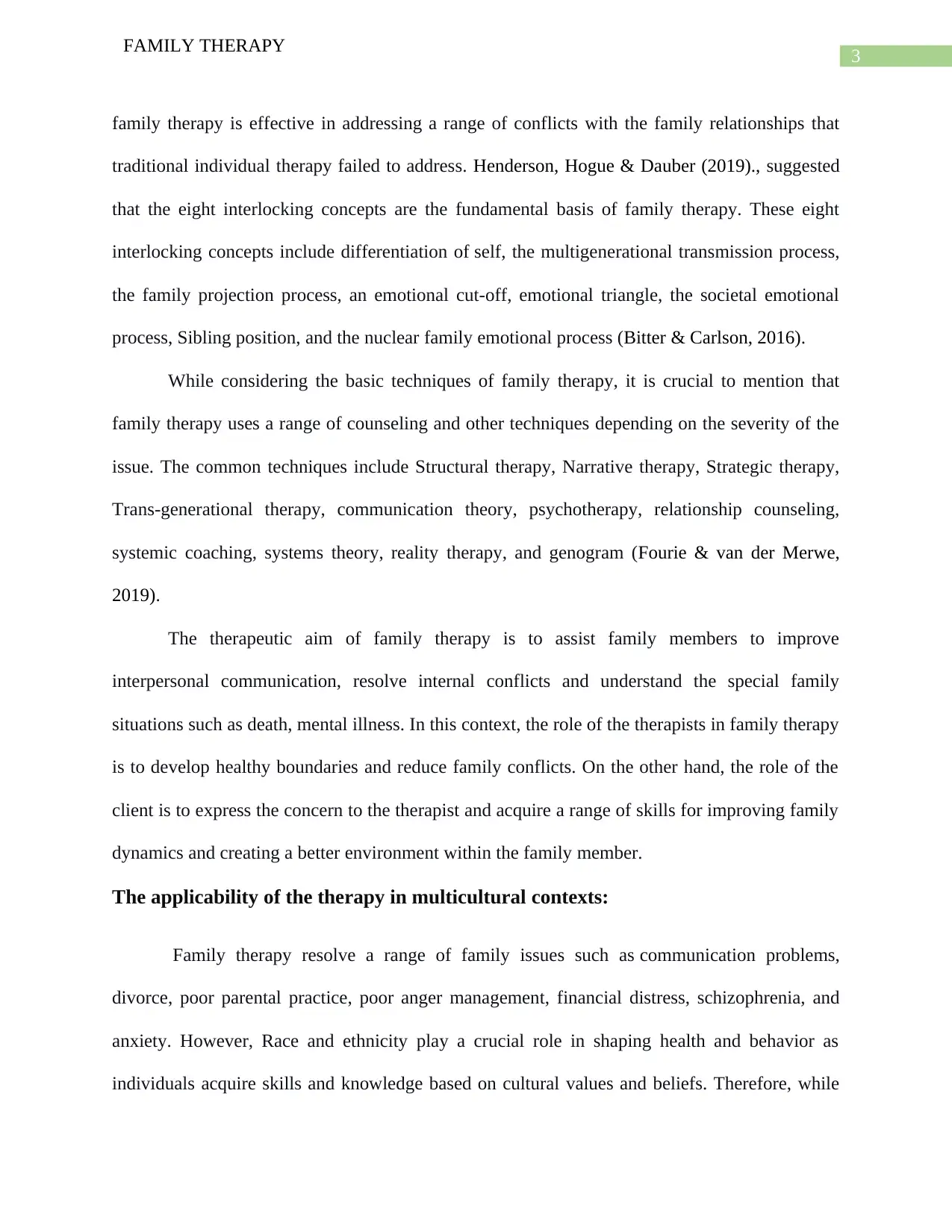
3
FAMILY THERAPY
family therapy is effective in addressing a range of conflicts with the family relationships that
traditional individual therapy failed to address. Henderson, Hogue & Dauber (2019)., suggested
that the eight interlocking concepts are the fundamental basis of family therapy. These eight
interlocking concepts include differentiation of self, the multigenerational transmission process,
the family projection process, an emotional cut-off, emotional triangle, the societal emotional
process, Sibling position, and the nuclear family emotional process (Bitter & Carlson, 2016).
While considering the basic techniques of family therapy, it is crucial to mention that
family therapy uses a range of counseling and other techniques depending on the severity of the
issue. The common techniques include Structural therapy, Narrative therapy, Strategic therapy,
Trans-generational therapy, communication theory, psychotherapy, relationship counseling,
systemic coaching, systems theory, reality therapy, and genogram (Fourie & van der Merwe,
2019).
The therapeutic aim of family therapy is to assist family members to improve
interpersonal communication, resolve internal conflicts and understand the special family
situations such as death, mental illness. In this context, the role of the therapists in family therapy
is to develop healthy boundaries and reduce family conflicts. On the other hand, the role of the
client is to express the concern to the therapist and acquire a range of skills for improving family
dynamics and creating a better environment within the family member.
The applicability of the therapy in multicultural contexts:
Family therapy resolve a range of family issues such as communication problems,
divorce, poor parental practice, poor anger management, financial distress, schizophrenia, and
anxiety. However, Race and ethnicity play a crucial role in shaping health and behavior as
individuals acquire skills and knowledge based on cultural values and beliefs. Therefore, while
FAMILY THERAPY
family therapy is effective in addressing a range of conflicts with the family relationships that
traditional individual therapy failed to address. Henderson, Hogue & Dauber (2019)., suggested
that the eight interlocking concepts are the fundamental basis of family therapy. These eight
interlocking concepts include differentiation of self, the multigenerational transmission process,
the family projection process, an emotional cut-off, emotional triangle, the societal emotional
process, Sibling position, and the nuclear family emotional process (Bitter & Carlson, 2016).
While considering the basic techniques of family therapy, it is crucial to mention that
family therapy uses a range of counseling and other techniques depending on the severity of the
issue. The common techniques include Structural therapy, Narrative therapy, Strategic therapy,
Trans-generational therapy, communication theory, psychotherapy, relationship counseling,
systemic coaching, systems theory, reality therapy, and genogram (Fourie & van der Merwe,
2019).
The therapeutic aim of family therapy is to assist family members to improve
interpersonal communication, resolve internal conflicts and understand the special family
situations such as death, mental illness. In this context, the role of the therapists in family therapy
is to develop healthy boundaries and reduce family conflicts. On the other hand, the role of the
client is to express the concern to the therapist and acquire a range of skills for improving family
dynamics and creating a better environment within the family member.
The applicability of the therapy in multicultural contexts:
Family therapy resolve a range of family issues such as communication problems,
divorce, poor parental practice, poor anger management, financial distress, schizophrenia, and
anxiety. However, Race and ethnicity play a crucial role in shaping health and behavior as
individuals acquire skills and knowledge based on cultural values and beliefs. Therefore, while
Paraphrase This Document
Need a fresh take? Get an instant paraphrase of this document with our AI Paraphraser
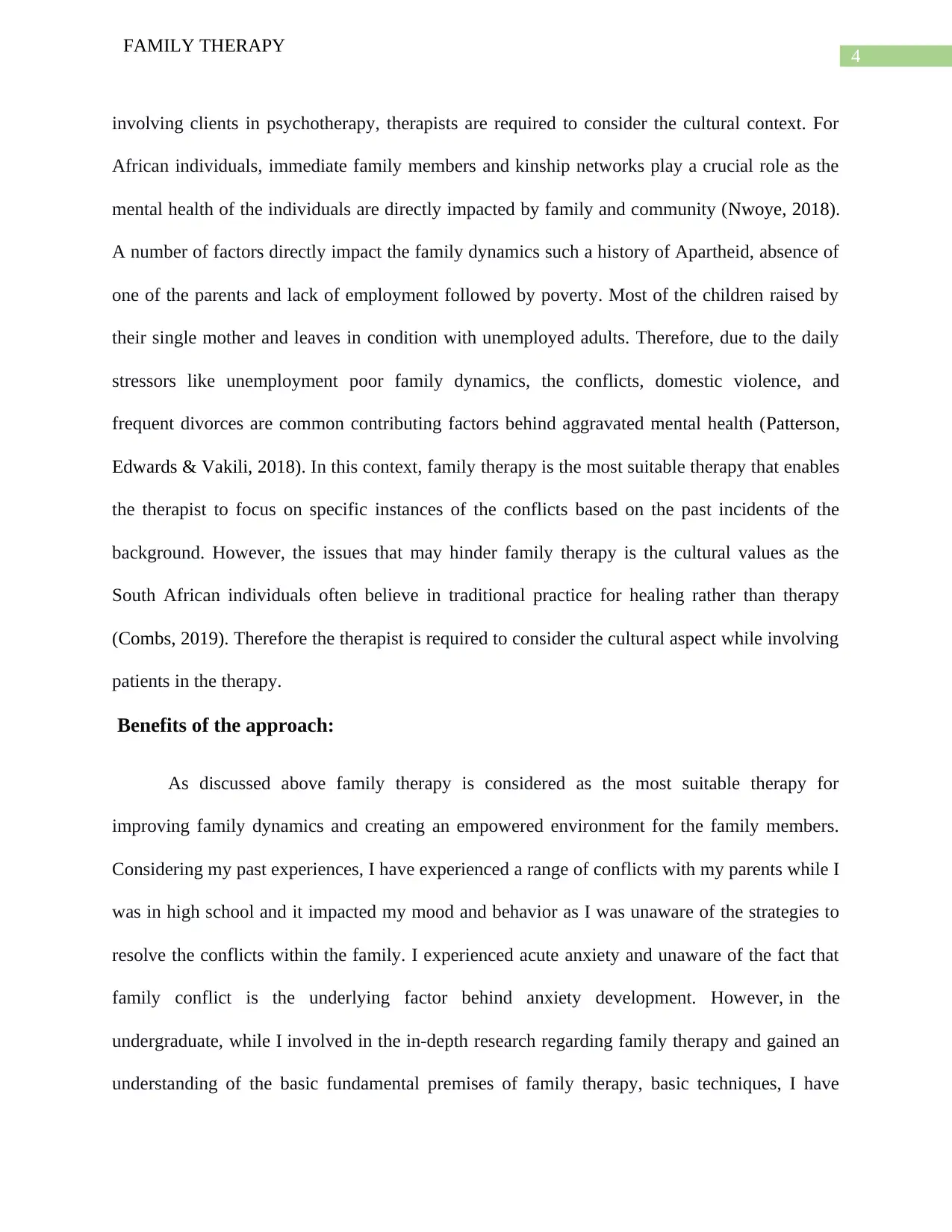
4
FAMILY THERAPY
involving clients in psychotherapy, therapists are required to consider the cultural context. For
African individuals, immediate family members and kinship networks play a crucial role as the
mental health of the individuals are directly impacted by family and community (Nwoye, 2018).
A number of factors directly impact the family dynamics such a history of Apartheid, absence of
one of the parents and lack of employment followed by poverty. Most of the children raised by
their single mother and leaves in condition with unemployed adults. Therefore, due to the daily
stressors like unemployment poor family dynamics, the conflicts, domestic violence, and
frequent divorces are common contributing factors behind aggravated mental health (Patterson,
Edwards & Vakili, 2018). In this context, family therapy is the most suitable therapy that enables
the therapist to focus on specific instances of the conflicts based on the past incidents of the
background. However, the issues that may hinder family therapy is the cultural values as the
South African individuals often believe in traditional practice for healing rather than therapy
(Combs, 2019). Therefore the therapist is required to consider the cultural aspect while involving
patients in the therapy.
Benefits of the approach:
As discussed above family therapy is considered as the most suitable therapy for
improving family dynamics and creating an empowered environment for the family members.
Considering my past experiences, I have experienced a range of conflicts with my parents while I
was in high school and it impacted my mood and behavior as I was unaware of the strategies to
resolve the conflicts within the family. I experienced acute anxiety and unaware of the fact that
family conflict is the underlying factor behind anxiety development. However, in the
undergraduate, while I involved in the in-depth research regarding family therapy and gained an
understanding of the basic fundamental premises of family therapy, basic techniques, I have
FAMILY THERAPY
involving clients in psychotherapy, therapists are required to consider the cultural context. For
African individuals, immediate family members and kinship networks play a crucial role as the
mental health of the individuals are directly impacted by family and community (Nwoye, 2018).
A number of factors directly impact the family dynamics such a history of Apartheid, absence of
one of the parents and lack of employment followed by poverty. Most of the children raised by
their single mother and leaves in condition with unemployed adults. Therefore, due to the daily
stressors like unemployment poor family dynamics, the conflicts, domestic violence, and
frequent divorces are common contributing factors behind aggravated mental health (Patterson,
Edwards & Vakili, 2018). In this context, family therapy is the most suitable therapy that enables
the therapist to focus on specific instances of the conflicts based on the past incidents of the
background. However, the issues that may hinder family therapy is the cultural values as the
South African individuals often believe in traditional practice for healing rather than therapy
(Combs, 2019). Therefore the therapist is required to consider the cultural aspect while involving
patients in the therapy.
Benefits of the approach:
As discussed above family therapy is considered as the most suitable therapy for
improving family dynamics and creating an empowered environment for the family members.
Considering my past experiences, I have experienced a range of conflicts with my parents while I
was in high school and it impacted my mood and behavior as I was unaware of the strategies to
resolve the conflicts within the family. I experienced acute anxiety and unaware of the fact that
family conflict is the underlying factor behind anxiety development. However, in the
undergraduate, while I involved in the in-depth research regarding family therapy and gained an
understanding of the basic fundamental premises of family therapy, basic techniques, I have
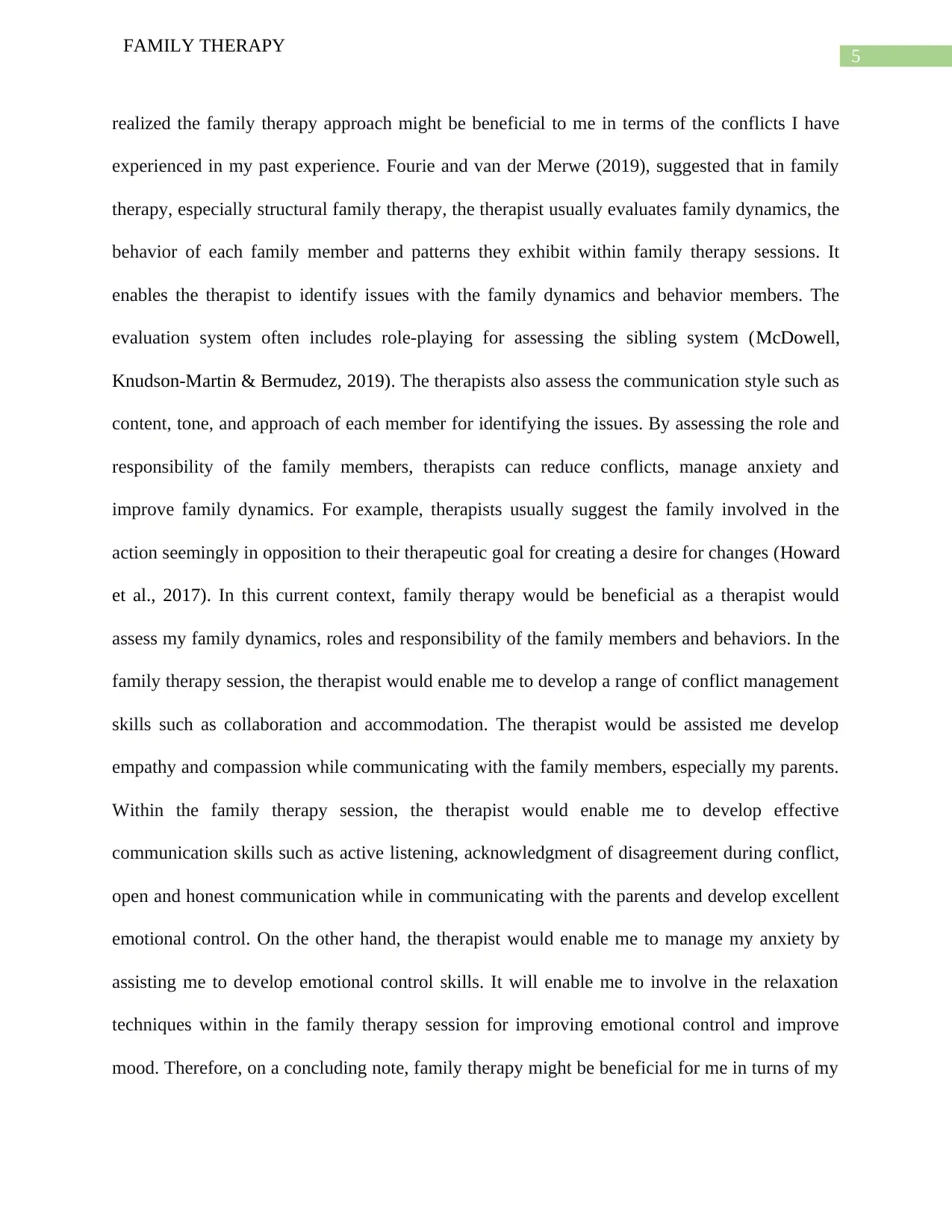
5
FAMILY THERAPY
realized the family therapy approach might be beneficial to me in terms of the conflicts I have
experienced in my past experience. Fourie and van der Merwe (2019), suggested that in family
therapy, especially structural family therapy, the therapist usually evaluates family dynamics, the
behavior of each family member and patterns they exhibit within family therapy sessions. It
enables the therapist to identify issues with the family dynamics and behavior members. The
evaluation system often includes role-playing for assessing the sibling system (McDowell,
Knudson‐Martin & Bermudez, 2019). The therapists also assess the communication style such as
content, tone, and approach of each member for identifying the issues. By assessing the role and
responsibility of the family members, therapists can reduce conflicts, manage anxiety and
improve family dynamics. For example, therapists usually suggest the family involved in the
action seemingly in opposition to their therapeutic goal for creating a desire for changes (Howard
et al., 2017). In this current context, family therapy would be beneficial as a therapist would
assess my family dynamics, roles and responsibility of the family members and behaviors. In the
family therapy session, the therapist would enable me to develop a range of conflict management
skills such as collaboration and accommodation. The therapist would be assisted me develop
empathy and compassion while communicating with the family members, especially my parents.
Within the family therapy session, the therapist would enable me to develop effective
communication skills such as active listening, acknowledgment of disagreement during conflict,
open and honest communication while in communicating with the parents and develop excellent
emotional control. On the other hand, the therapist would enable me to manage my anxiety by
assisting me to develop emotional control skills. It will enable me to involve in the relaxation
techniques within in the family therapy session for improving emotional control and improve
mood. Therefore, on a concluding note, family therapy might be beneficial for me in turns of my
FAMILY THERAPY
realized the family therapy approach might be beneficial to me in terms of the conflicts I have
experienced in my past experience. Fourie and van der Merwe (2019), suggested that in family
therapy, especially structural family therapy, the therapist usually evaluates family dynamics, the
behavior of each family member and patterns they exhibit within family therapy sessions. It
enables the therapist to identify issues with the family dynamics and behavior members. The
evaluation system often includes role-playing for assessing the sibling system (McDowell,
Knudson‐Martin & Bermudez, 2019). The therapists also assess the communication style such as
content, tone, and approach of each member for identifying the issues. By assessing the role and
responsibility of the family members, therapists can reduce conflicts, manage anxiety and
improve family dynamics. For example, therapists usually suggest the family involved in the
action seemingly in opposition to their therapeutic goal for creating a desire for changes (Howard
et al., 2017). In this current context, family therapy would be beneficial as a therapist would
assess my family dynamics, roles and responsibility of the family members and behaviors. In the
family therapy session, the therapist would enable me to develop a range of conflict management
skills such as collaboration and accommodation. The therapist would be assisted me develop
empathy and compassion while communicating with the family members, especially my parents.
Within the family therapy session, the therapist would enable me to develop effective
communication skills such as active listening, acknowledgment of disagreement during conflict,
open and honest communication while in communicating with the parents and develop excellent
emotional control. On the other hand, the therapist would enable me to manage my anxiety by
assisting me to develop emotional control skills. It will enable me to involve in the relaxation
techniques within in the family therapy session for improving emotional control and improve
mood. Therefore, on a concluding note, family therapy might be beneficial for me in turns of my
⊘ This is a preview!⊘
Do you want full access?
Subscribe today to unlock all pages.

Trusted by 1+ million students worldwide
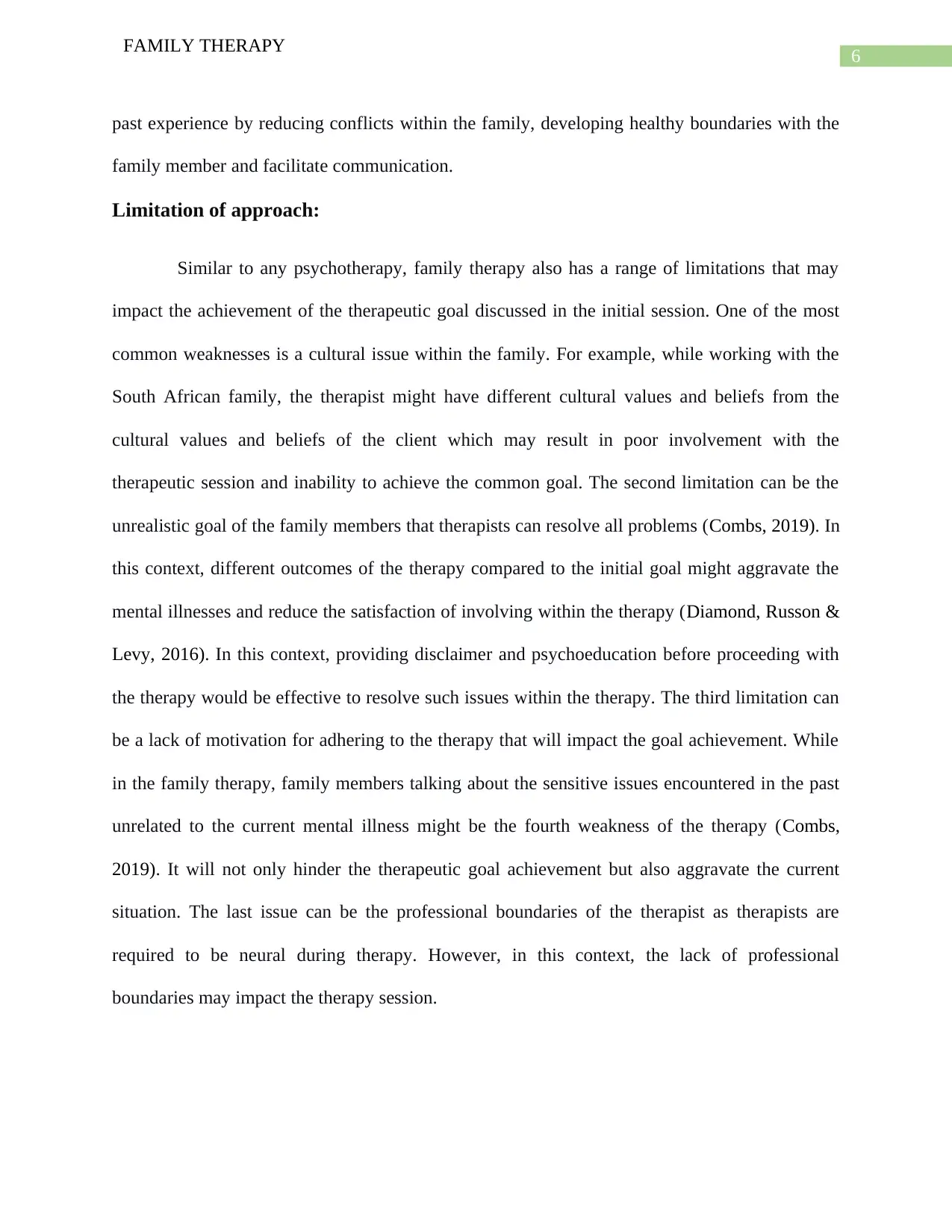
6
FAMILY THERAPY
past experience by reducing conflicts within the family, developing healthy boundaries with the
family member and facilitate communication.
Limitation of approach:
Similar to any psychotherapy, family therapy also has a range of limitations that may
impact the achievement of the therapeutic goal discussed in the initial session. One of the most
common weaknesses is a cultural issue within the family. For example, while working with the
South African family, the therapist might have different cultural values and beliefs from the
cultural values and beliefs of the client which may result in poor involvement with the
therapeutic session and inability to achieve the common goal. The second limitation can be the
unrealistic goal of the family members that therapists can resolve all problems (Combs, 2019). In
this context, different outcomes of the therapy compared to the initial goal might aggravate the
mental illnesses and reduce the satisfaction of involving within the therapy (Diamond, Russon &
Levy, 2016). In this context, providing disclaimer and psychoeducation before proceeding with
the therapy would be effective to resolve such issues within the therapy. The third limitation can
be a lack of motivation for adhering to the therapy that will impact the goal achievement. While
in the family therapy, family members talking about the sensitive issues encountered in the past
unrelated to the current mental illness might be the fourth weakness of the therapy (Combs,
2019). It will not only hinder the therapeutic goal achievement but also aggravate the current
situation. The last issue can be the professional boundaries of the therapist as therapists are
required to be neural during therapy. However, in this context, the lack of professional
boundaries may impact the therapy session.
FAMILY THERAPY
past experience by reducing conflicts within the family, developing healthy boundaries with the
family member and facilitate communication.
Limitation of approach:
Similar to any psychotherapy, family therapy also has a range of limitations that may
impact the achievement of the therapeutic goal discussed in the initial session. One of the most
common weaknesses is a cultural issue within the family. For example, while working with the
South African family, the therapist might have different cultural values and beliefs from the
cultural values and beliefs of the client which may result in poor involvement with the
therapeutic session and inability to achieve the common goal. The second limitation can be the
unrealistic goal of the family members that therapists can resolve all problems (Combs, 2019). In
this context, different outcomes of the therapy compared to the initial goal might aggravate the
mental illnesses and reduce the satisfaction of involving within the therapy (Diamond, Russon &
Levy, 2016). In this context, providing disclaimer and psychoeducation before proceeding with
the therapy would be effective to resolve such issues within the therapy. The third limitation can
be a lack of motivation for adhering to the therapy that will impact the goal achievement. While
in the family therapy, family members talking about the sensitive issues encountered in the past
unrelated to the current mental illness might be the fourth weakness of the therapy (Combs,
2019). It will not only hinder the therapeutic goal achievement but also aggravate the current
situation. The last issue can be the professional boundaries of the therapist as therapists are
required to be neural during therapy. However, in this context, the lack of professional
boundaries may impact the therapy session.
Paraphrase This Document
Need a fresh take? Get an instant paraphrase of this document with our AI Paraphraser
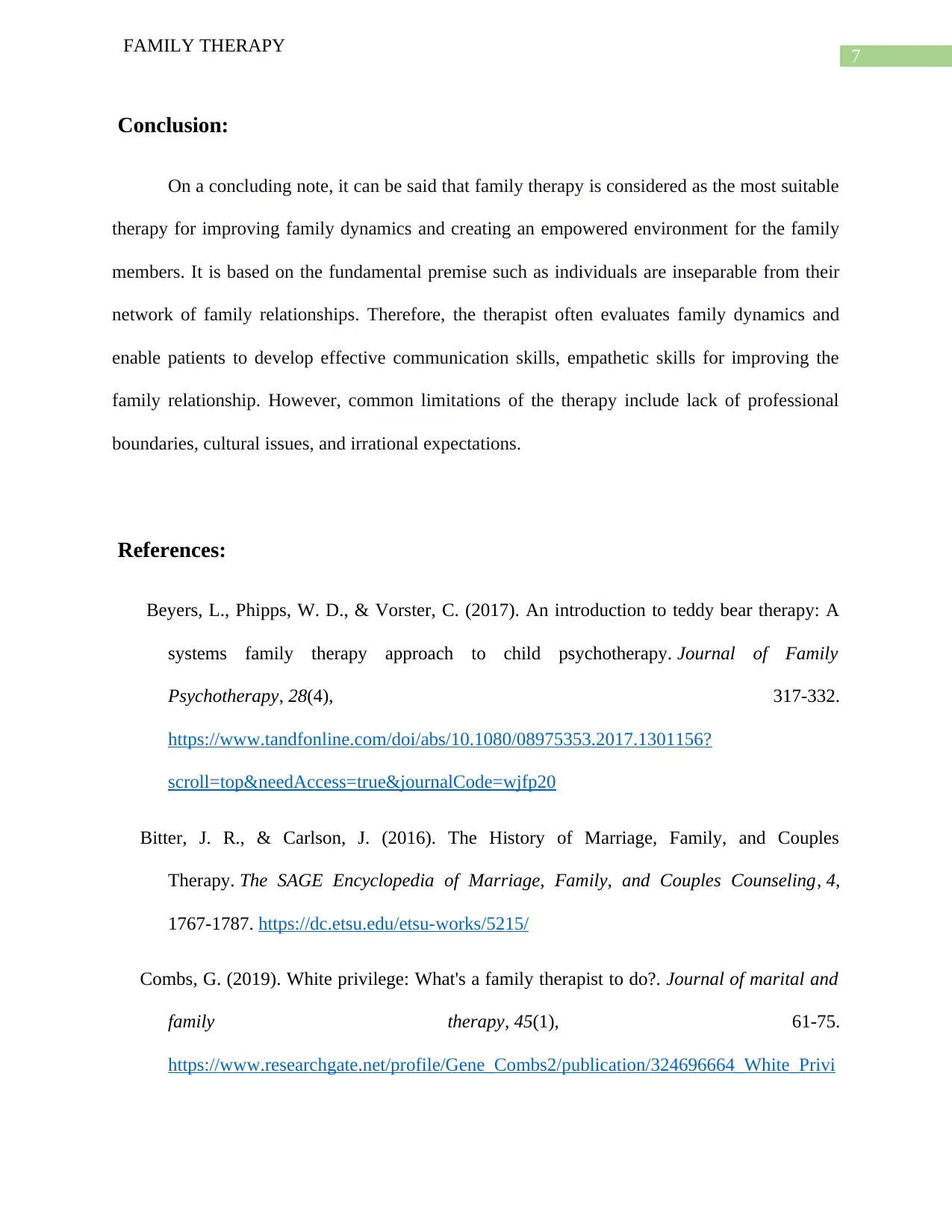
7
FAMILY THERAPY
Conclusion:
On a concluding note, it can be said that family therapy is considered as the most suitable
therapy for improving family dynamics and creating an empowered environment for the family
members. It is based on the fundamental premise such as individuals are inseparable from their
network of family relationships. Therefore, the therapist often evaluates family dynamics and
enable patients to develop effective communication skills, empathetic skills for improving the
family relationship. However, common limitations of the therapy include lack of professional
boundaries, cultural issues, and irrational expectations.
References:
Beyers, L., Phipps, W. D., & Vorster, C. (2017). An introduction to teddy bear therapy: A
systems family therapy approach to child psychotherapy. Journal of Family
Psychotherapy, 28(4), 317-332.
https://www.tandfonline.com/doi/abs/10.1080/08975353.2017.1301156?
scroll=top&needAccess=true&journalCode=wjfp20
Bitter, J. R., & Carlson, J. (2016). The History of Marriage, Family, and Couples
Therapy. The SAGE Encyclopedia of Marriage, Family, and Couples Counseling, 4,
1767-1787. https://dc.etsu.edu/etsu-works/5215/
Combs, G. (2019). White privilege: What's a family therapist to do?. Journal of marital and
family therapy, 45(1), 61-75.
https://www.researchgate.net/profile/Gene_Combs2/publication/324696664_White_Privi
FAMILY THERAPY
Conclusion:
On a concluding note, it can be said that family therapy is considered as the most suitable
therapy for improving family dynamics and creating an empowered environment for the family
members. It is based on the fundamental premise such as individuals are inseparable from their
network of family relationships. Therefore, the therapist often evaluates family dynamics and
enable patients to develop effective communication skills, empathetic skills for improving the
family relationship. However, common limitations of the therapy include lack of professional
boundaries, cultural issues, and irrational expectations.
References:
Beyers, L., Phipps, W. D., & Vorster, C. (2017). An introduction to teddy bear therapy: A
systems family therapy approach to child psychotherapy. Journal of Family
Psychotherapy, 28(4), 317-332.
https://www.tandfonline.com/doi/abs/10.1080/08975353.2017.1301156?
scroll=top&needAccess=true&journalCode=wjfp20
Bitter, J. R., & Carlson, J. (2016). The History of Marriage, Family, and Couples
Therapy. The SAGE Encyclopedia of Marriage, Family, and Couples Counseling, 4,
1767-1787. https://dc.etsu.edu/etsu-works/5215/
Combs, G. (2019). White privilege: What's a family therapist to do?. Journal of marital and
family therapy, 45(1), 61-75.
https://www.researchgate.net/profile/Gene_Combs2/publication/324696664_White_Privi
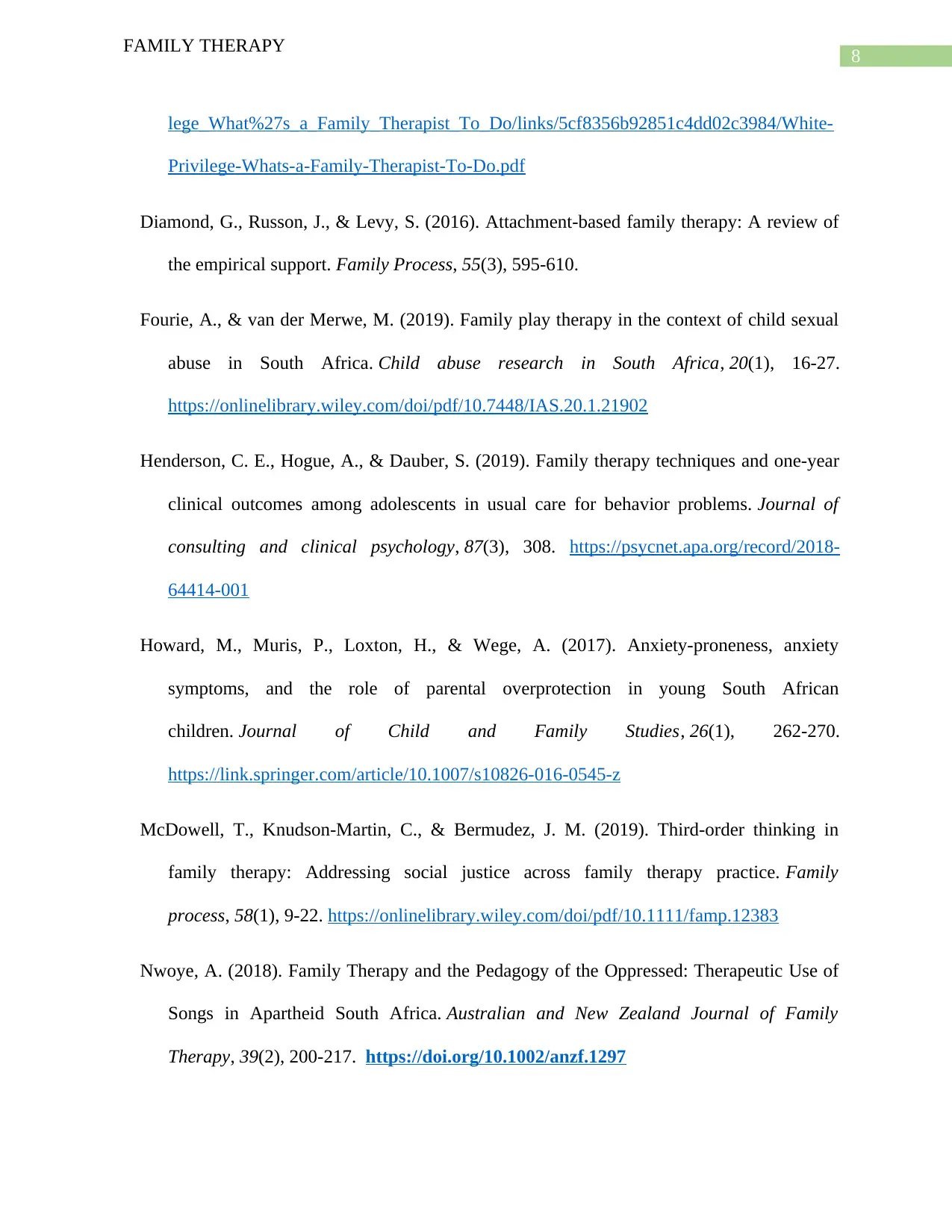
8
FAMILY THERAPY
lege_What%27s_a_Family_Therapist_To_Do/links/5cf8356b92851c4dd02c3984/White-
Privilege-Whats-a-Family-Therapist-To-Do.pdf
Diamond, G., Russon, J., & Levy, S. (2016). Attachment‐based family therapy: A review of
the empirical support. Family Process, 55(3), 595-610.
Fourie, A., & van der Merwe, M. (2019). Family play therapy in the context of child sexual
abuse in South Africa. Child abuse research in South Africa, 20(1), 16-27.
https://onlinelibrary.wiley.com/doi/pdf/10.7448/IAS.20.1.21902
Henderson, C. E., Hogue, A., & Dauber, S. (2019). Family therapy techniques and one-year
clinical outcomes among adolescents in usual care for behavior problems. Journal of
consulting and clinical psychology, 87(3), 308. https://psycnet.apa.org/record/2018-
64414-001
Howard, M., Muris, P., Loxton, H., & Wege, A. (2017). Anxiety-proneness, anxiety
symptoms, and the role of parental overprotection in young South African
children. Journal of Child and Family Studies, 26(1), 262-270.
https://link.springer.com/article/10.1007/s10826-016-0545-z
McDowell, T., Knudson‐Martin, C., & Bermudez, J. M. (2019). Third‐order thinking in
family therapy: Addressing social justice across family therapy practice. Family
process, 58(1), 9-22. https://onlinelibrary.wiley.com/doi/pdf/10.1111/famp.12383
Nwoye, A. (2018). Family Therapy and the Pedagogy of the Oppressed: Therapeutic Use of
Songs in Apartheid South Africa. Australian and New Zealand Journal of Family
Therapy, 39(2), 200-217. https://doi.org/10.1002/anzf.1297
FAMILY THERAPY
lege_What%27s_a_Family_Therapist_To_Do/links/5cf8356b92851c4dd02c3984/White-
Privilege-Whats-a-Family-Therapist-To-Do.pdf
Diamond, G., Russon, J., & Levy, S. (2016). Attachment‐based family therapy: A review of
the empirical support. Family Process, 55(3), 595-610.
Fourie, A., & van der Merwe, M. (2019). Family play therapy in the context of child sexual
abuse in South Africa. Child abuse research in South Africa, 20(1), 16-27.
https://onlinelibrary.wiley.com/doi/pdf/10.7448/IAS.20.1.21902
Henderson, C. E., Hogue, A., & Dauber, S. (2019). Family therapy techniques and one-year
clinical outcomes among adolescents in usual care for behavior problems. Journal of
consulting and clinical psychology, 87(3), 308. https://psycnet.apa.org/record/2018-
64414-001
Howard, M., Muris, P., Loxton, H., & Wege, A. (2017). Anxiety-proneness, anxiety
symptoms, and the role of parental overprotection in young South African
children. Journal of Child and Family Studies, 26(1), 262-270.
https://link.springer.com/article/10.1007/s10826-016-0545-z
McDowell, T., Knudson‐Martin, C., & Bermudez, J. M. (2019). Third‐order thinking in
family therapy: Addressing social justice across family therapy practice. Family
process, 58(1), 9-22. https://onlinelibrary.wiley.com/doi/pdf/10.1111/famp.12383
Nwoye, A. (2018). Family Therapy and the Pedagogy of the Oppressed: Therapeutic Use of
Songs in Apartheid South Africa. Australian and New Zealand Journal of Family
Therapy, 39(2), 200-217. https://doi.org/10.1002/anzf.1297
⊘ This is a preview!⊘
Do you want full access?
Subscribe today to unlock all pages.

Trusted by 1+ million students worldwide
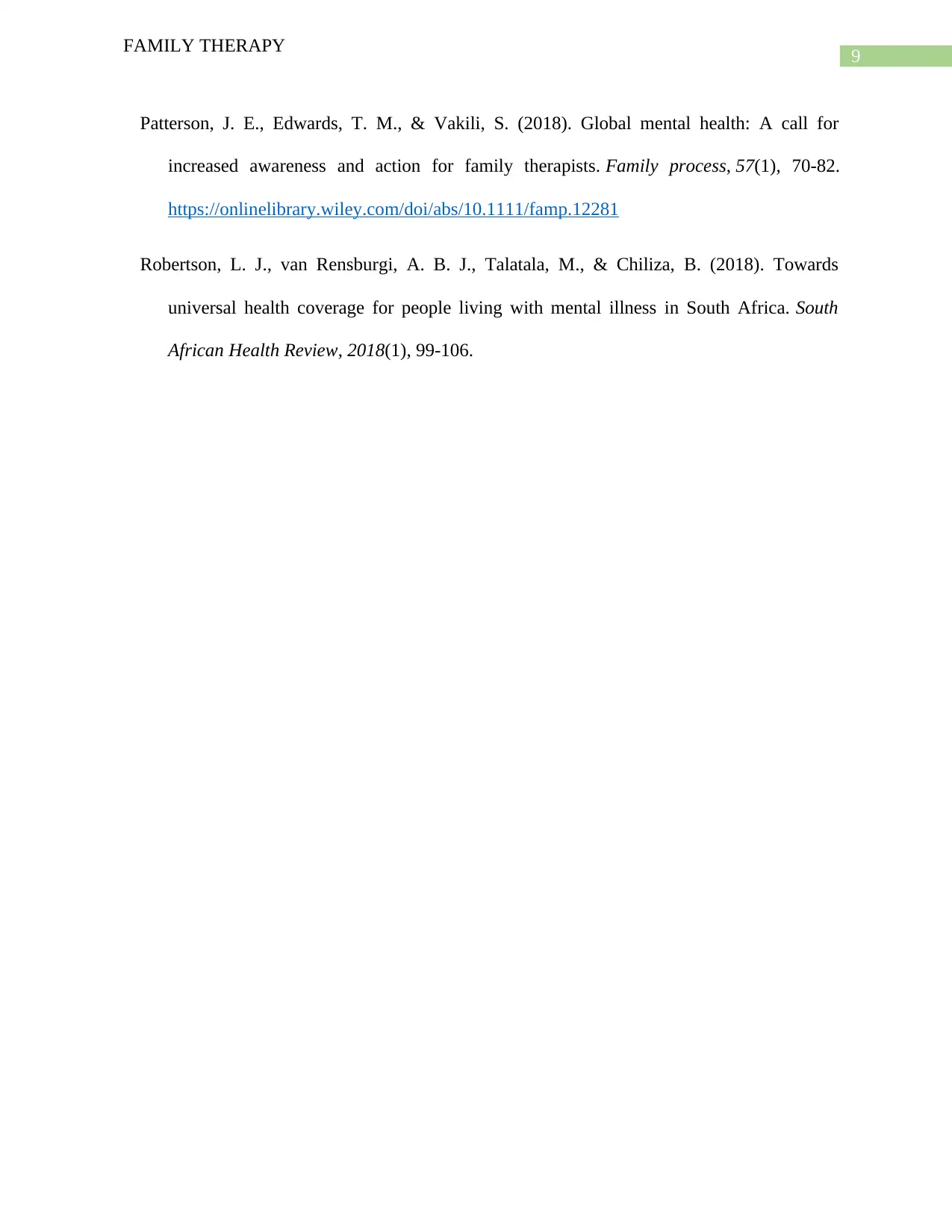
9
FAMILY THERAPY
Patterson, J. E., Edwards, T. M., & Vakili, S. (2018). Global mental health: A call for
increased awareness and action for family therapists. Family process, 57(1), 70-82.
https://onlinelibrary.wiley.com/doi/abs/10.1111/famp.12281
Robertson, L. J., van Rensburgi, A. B. J., Talatala, M., & Chiliza, B. (2018). Towards
universal health coverage for people living with mental illness in South Africa. South
African Health Review, 2018(1), 99-106.
FAMILY THERAPY
Patterson, J. E., Edwards, T. M., & Vakili, S. (2018). Global mental health: A call for
increased awareness and action for family therapists. Family process, 57(1), 70-82.
https://onlinelibrary.wiley.com/doi/abs/10.1111/famp.12281
Robertson, L. J., van Rensburgi, A. B. J., Talatala, M., & Chiliza, B. (2018). Towards
universal health coverage for people living with mental illness in South Africa. South
African Health Review, 2018(1), 99-106.
1 out of 10
Related Documents
Your All-in-One AI-Powered Toolkit for Academic Success.
+13062052269
info@desklib.com
Available 24*7 on WhatsApp / Email
![[object Object]](/_next/static/media/star-bottom.7253800d.svg)
Unlock your academic potential
Copyright © 2020–2026 A2Z Services. All Rights Reserved. Developed and managed by ZUCOL.





